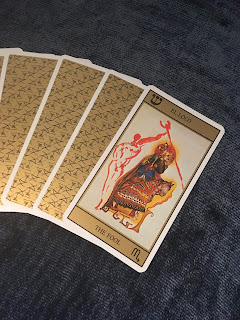Writers: the Human Condition is Non-Binary!
Binarism refers to the commonly-held belief that all of humanity can be divided into two opposing categories, like male and female or good and bad. Superficial dichotomies like these are present in almost all of Western literature, film, and art, as well as in myth and religion, and even the tarot.
Gender, sexuality, and race are traditionally viewed as binaries inherent to our biology, when really these identities are socially-constructed. Binarism is used to enforce oppressive systems of control, like cis-hetero-patriarchy, white supremacy, and imperialism.
Identity as Social-Constructed Binaries
Gender binarism reduces the human experience to two choices posed as opposites: male or female. Not only do these identities have more similarities than differences; they also aren’t inherently biological, and they aren’t the only ones that exist!
The fact that many cultures traditionally have three genders proves that gender identity is a product of society, and can change, multiply, or even cease to exist.
People who assigned the wrong gender at birth are transgender, whereas people who identify with the gender assigned to them at birth are cisgender. You can be a trans woman, a trans man, or trans and non-binary.
Non-binary describes people who don’t identify within the gender binary of man and woman. It’s an umbrella term that encompasses identities like genderqueer, genderfluid, bigender, agender, and hundreds of others. Non-binary people may partly identify as a man or a woman, their gender might change or switch between others, or they may not have a gender. The term can also include culture-specific genders, like two-spirit, which is a spiritual gender identity within the Native American community.
People experience gender in uncountably unique ways, just as appearances and self-expression vary from person to person!
Even sex is a spectrum, since chromosomes aren’t always as simple as XX and XY, and hormone levels vary. About 1.7% of the world’s population is intersex, meaning they possess both male and female sex traits. Certain conditions can also blur the lines of sex and gender, such as polycystic ovary syndrome, which can cause people assigned female to grow facial hair.
We often think of attraction as a binary, too: you’re either hetero- or homosexual, when in reality, attraction to multiple, all, or no genders exists. Bisexuals are attracted to more than one gender, pansexuals are attracted to people regardless of gender, and asexuals aren’t attracted to any gender.
We also tend to ignore the existence of multiracial individuals, and talk about race as a static, biological “this or that” option, rather than the socially-constructed and constantly changing identity that it is.
In the recent past, latinx and hispanic identities were considered “white” in the U.S. before immigration became an issue, just as Italian, Dutch, and Irish immigrants were once considered non-white. You can now witness the redrawing of racial lines in response to the War on Terror, with “Middle Eastern” becoming its own racial category.
All of these facets of identity get reduced to a binary, when in reality, the possibilities of human experience are infinite.
How this Affects Your Writing
When stories replicate binaries like good vs evil, the hero and the damsel, or the white savior and the marginalized people, they fail to accurately depict the depths--the history, the diversity, the moral ambiguity--of the human experience.
How many times have you stopped reading a story because of its reductive “good vs. bad” plot or tired damsel in distress trope? Apply the same frustration to a queer reader who only sees heterosexual romances in books or a trans woman who only sees cis-womanhood in books. It’s not that heterosexuality and cis people don’t deserve stories--it’s that these identities and experiences are always the default.
Most of Western literature poses white, heterosexual cis men as the universal carrier of the human condition, as if all of human history and experiences can be represented by a minor percentage of the world’s population. That’s not to say that these stories don’t have value; they just comprise an overwhelming majority of our media, which erases the existence and importance of anyone who doesn’t fit the mold, essentially dehumanizing the “other.”
Stories are a testament to our humanity. It’s been proven that reading increases empathy and encourages people to learn different perspectives from their own and value them as equal.
Your characters and your stories are only as complex as you view the world, and if you confine people to a binary, your fiction will never accurately portray the human condition. Diversity is our reality. Identity and expression have always been complicated. Write characters that reflect the truth of our world.


Comments
Post a Comment